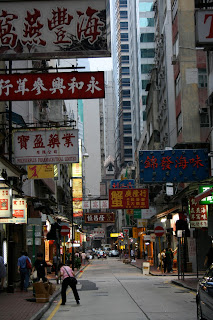I believe this attitude--which I am familiar with--comes from the cumulative stress of daily life being harder than it was before, and hardship posts may be more disruptive than others. Hardship posts earn their designations for a variety of factors, but they are all cities "where conditions of environment differ substantially from conditions of environment in the United States." Life in a non-hardship isn't necessarily better, but it's probably easier--at least at first.
Manila is a hardship post with a relatively high differential rating (meaning it's harder than most places), but not for the same reasons as Mauritania, Africa or Kabul. Once I battle the traffic and the smog and arrive at the grocery store I can find most of the things I need (although not necessarily in the same place two weeks in a row) as long as I'm willing to pay for them. But Manila is certainly a place where the environmental conditions are different than the US, which has given me the opportunity to reflect on trade-offs in the Foreign Service.
Throughout our lives we prioritize and make choices, but when basic aspects of life such as housing are inconstant, we are more frequently confronted with the compromises involved in our choices. The Foreign Service requires you to make a lot of choices on faith. You don't really know what a post will be like until after you've lived there a few months. Some times things work out just like you imagined, and sometimes they don't.
When we headed to DC for A-100, I left my career as I knew it behind. A thriving therapy practice and foreign service spousehood don't mix well. I knew that was choosing a professional life change, but I had no idea what that change would look like.
We extensively researched ways for me to have a career--career being a loosely defined term that included everything from jam making to getting another graduate degree, but until recently I had no idea what would happen to my professional identity.
Fortunately I had something to ground me: I knew what I didn't want to do.
There are many things that you give up when you choose a life in the Foreign Service, but this life has benefits far beyond hardship pay differentials and weekend trips to tropical paradises (although I must say the weekend trips are pretty awesome). Thanks to my supervisor's support with unpaid leave and FLO's professional development fellowship program, I am beginning a month-long, intensive, 200 hour vinyasa flow yoga teacher training next week.
For several years being a yoga teacher has been my dream, but it was never feasible because the training requires a significant commitment of time and money, and I already had a full-time job. But now I have the opportunity to pursue a career that would have been difficult if not impossible before we joined the Foreign Service. Thank you, FLO, Manila CLO, and my husband, whose desire to be a Foreign Service Officer helped me find a new professional home!
Julie the Yogini










